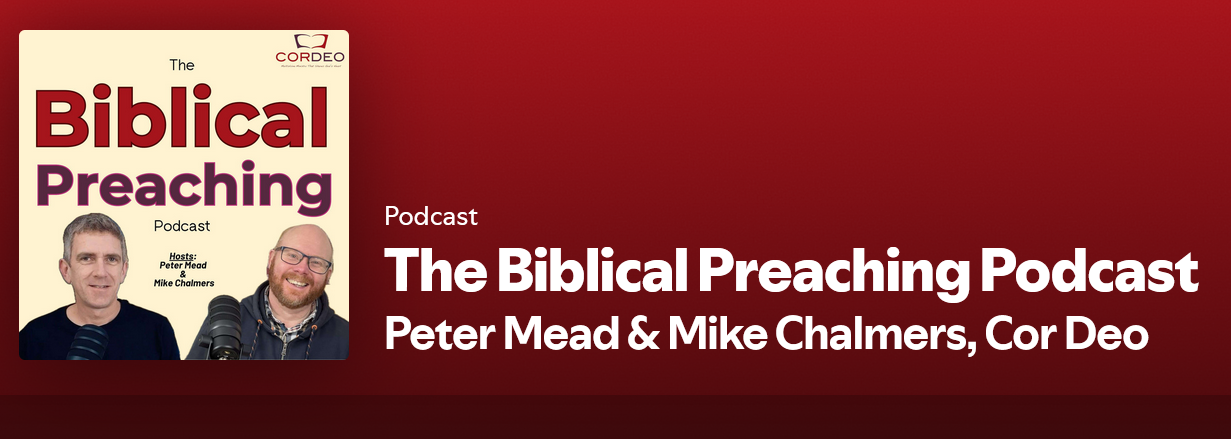Peter Mead has got to know preachers throughout Europe over the last two decades. He is passionate about demonstrating that good biblical preaching changes people's lives. A blog for preachers and a podcast offer extensive practical training.
![Peter Mead. / Photo: [link]Trinity Chippenham[/link].](https://cms.evangelicalfocus.com/upload/imagenes/686bd2273cbf2_petermead940Cropped.jpg) Peter Mead. / Photo: [link]Trinity Chippenham[/link].
Peter Mead. / Photo: [link]Trinity Chippenham[/link].
The Bible is irrelevant and has nothing to say to people in the 21st century. This has been a latent message in European cultures for some time, although some statistics are beginning to point to a revival of interest.
Regardless of the trends, evangelical churches in Europe have for the most part not succumbed to the temptation to omit the Bible. But there is a debate about whether public preaching on Sunday mornings should retain its central status.
Peter Mead is convinced that the exposition of Bible passages should keep its centrality, and he shares practical examples on how to do it on his personal blog and his column on Evangelical Focus.
But when does a preacher really achieve their goal? This question, which Mead has explored for years, is the central theme of this interview.
Question. Let’s start with the basic question. Why is preaching the Bible from the front on a Sunday service even important anymore?
Answer. People often try to answer this question by talking about how culture has shifted and questioning whether it is appropriate to preach any more. Actually, cultures have always shifted, even within Bible times there were massive differences in culture.
And yet, throughout all the Bible times, and throughout all of history, preaching has been a key ministry of the church. Not because culture demanded it, but because of who God is. He is a communicator. He is a God who has spoken and wants to be heard in the church and in the world.
If the goal were education, then there might be a “better way.” But the goal is for God’s voice to be heard, and so preaching remains a critical piece of church life. I also think that people suffer under a lot of poor preaching. The solution to that is not less preaching, but better preaching!

[photo_footer] The Biblical Preaching blog has been sharing practical advice and reflections for almost two decades. [/photo_footer] Q. You’ve been publishing very regularly your blog Biblical Preaching on all kind of specifics related to preaching. What has kept you posting?
A. Well, the blog has morphed over time. I began in 2007 because I was writing answers to questions my friends were raising about preaching. I decided to start the blog and kept going from there.
[destacate]“A lot of preachers only know what they have seen others do, and perhaps that example hasn’t been as thrilling as they might have preferred!”[/destacate]I have certainly reduced the amount of posts over recent years – especially when working on book projects or being busy with other ministry. But the reason I write is because I am thinking about preaching a lot. I believe that preaching is critically important, and if we can help churches have healthier preaching, then we will see healthier churches, which will impact their communities more.
Q. What has been your real-life ‘laboratory’ on preaching all these years?
A. I preach a lot. I have the privilege of preaching regularly in the church I helped to start 11 years ago, and I also have the privilege of preaching as a guest in other churches, events and multiple cultures.
So I have the weekly rhythm of preaching to the same people who I know and know me well, but I also get the perspective of being an outsider coming into a setting and preaching.
Alongside that, I also have the privilege of teaching preaching at Union School of Theology, in the European Leadership Forum and sometimes in Cor Deo too. Preaching and teaching preaching are both great laboratories!
[destacate]“Trust God as a communicator. What you can make the text say is not as good as what God made it say”[/destacate]Q. You are from the UK but you’ve been leading a network for preachers from many countries in the context of the annual European Leadership Forum. What are the main challenges do preachers have across Europe?
A. Probably discouragement and lack of training. A lot of preachers only know what they have seen others do, and perhaps that example hasn’t been as thrilling as they might have preferred!
When people get a taste of really biblical, clear, engaging and relevant biblical preaching, it not only excites them for what they are receiving but also opens up the potential to give the same to others.
For a lot of European preachers, they might have only heard one style of preaching, and being in a small church context without much resources and opportunity to hear good preaching and learn about it.
That’s why I love the ELF! I get to help churches get good preaching, which is great because healthy preaching helps to grow healthy churches, and healthy churches will reach their community and culture more effectively.
Q. Any young theology graduate or someone who has just been offered to exercise his or her gifts in teaching at their local church has loads of questions on where to start. What would your first tips for a new preacher be?
A. Trust God as a communicator. What you can make the text say is not as good as what God made it say.
[destacate]“You don’t have to preach everything you know about the Bible, nor even everything you learn about the passage you are preaching”[/destacate]Don’t try to impress people, don’t try to be an expert lecturer, just prayerfully focus on sharing with others the blessing of really grasping and being gripped by a Bible passage. You don’t have to preach everything you know about the Bible, nor even everything you learn about the passage you are preaching – just prayerfully prepare as best you can to present this passage with an expectation that it can change lives.
How does it change lives? Not primarily through the instructions you can spot and then amplify in an attempt to pressure people, but through the self-revelation of God’s heart, character, plan, etc. So, look to introduce people to the person who is revealed through the passage. People are wired to respond from the heart to a clear glimpse of God’s heart!

[photo_footer] The 'Cor Deo' podcast on preaching on Spotify. [/photo_footer] Q. Mike Chalmers and yourself both are serving through Cor Deo. Tell us a bit about this ministry.
A. Cor Deo means a heart for God. That is our desire, to offer training opportunities that multiply ministry that shares God’s heart. So, Cor Deo actually began as a six-month mentored training course. We ran that over five years but then brought that course to an end.
[destacate]“People are wired to respond from the heart to a clear glimpse of God’s heart!”[/destacate]Now our focus is on shorter courses. Two, three, or four day courses. We love to get a small group of people together to study the Bible together, to understand some foundational realities of the Christian faith that will launch people into a healthy and heartfelt closer walk with Jesus, and to apply the theological lessons we learn into the practical areas of relationships, evangelism and personal spiritual growth.
Cor Deo isn’t about academic pressure and exams, it is about an oasis of enjoying discovering who God is that will help people then enjoy their walk with Jesus so much more. To be known and loved by a loving God is an indescribable privilege, but we try to grasp that reality just a little bit more each time!
Q. Finally, where can people follow your podcast?
The ‘Biblical Preaching Podcast’ is available on Spotify, Apple, and on the Cor Deo YouTube channel too. I hope it is helpful!
[analysis]
[title]Join us to make EF sustainable[/title]
[photo][/photo]
[text]At Evangelical Focus, we have a sustainability challenge ahead. We invite you to join those across Europe and beyond who are committed with our mission. Together, we will ensure the continuity of Evangelical Focus and our Spanish partner Protestante Digital in 2025.
Learn all about our #TogetherInThisMission initiative here (English).
[/text][/analysis]

Las opiniones vertidas por nuestros colaboradores se realizan a nivel personal, pudiendo coincidir o no con la postura de la dirección de Protestante Digital.
Si quieres comentar o